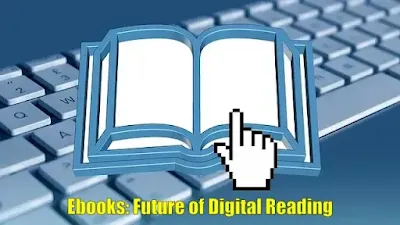Ebooks: Evolution, Advantages, and Future of Digital Reading
In the digital age, the way we consume information and
entertainment has undergone a significant transformation. One of the most
notable changes has been the shift from traditional printed books to electronic
books, or ebooks. This comprehensive guide delves into the world of ebooks,
examining their history, advantages, various formats, and the future of digital
reading.
The Evolution of Ebooks
Early Beginnings
The concept of ebooks dates back to the early 1970s
when Michael S. Hart, the founder of Project Gutenberg, digitized the United
States Declaration of Independence. This pioneering effort marked the birth of
digital literature and laid the foundation for the development of the ebook
industry.
Technological Advancements
The evolution of personal computers and the internet
in the 1990s played a pivotal role in the proliferation of ebooks. The
introduction of dedicated e-readers like the Sony Librie and Amazon Kindle
revolutionized the market, making digital books more accessible and
user-friendly. These devices utilized E Ink technology to mimic the appearance
of printed text, significantly enhancing the reading experience.
Ebooks - Advantages
Portability
the most advantages of ebooks is their portability.
A single
e-reader can store thousands of books, allowing readers to carry an entire
library with them wherever they go. This convenience is particularly beneficial
for travelers, students, and avid readers.
Accessibility
Ebooks have democratized access to literature. Digital
platforms offer a vast array of books that can be downloaded instantly from
anywhere in the world. This has been particularly transformative for people
living in remote areas or regions with limited access to physical bookstores.
Cost-Effectiveness
Ebooks are often more affordable than their printed
counterparts. The absence of printing, shipping, and physical storage costs
allows publishers to offer ebooks at lower prices. Additionally, many classic
works and educational materials are available for free or at a nominal cost.
Customization and Interactivity
Ebooks provide a customizable reading experience.
Readers can adjust font sizes, background colors, and brightness levels to suit
their preferences. Interactive features such as hyperlinks, multimedia
elements, and annotations enhance engagement and comprehension, particularly in
educational and reference materials.
Ebook Formats and Devices
Popular Ebook Formats
Several formats have emerged in the ebook industry,
each with its own set of features and compatibility:
1. EPUB: Widely supported by e-readers,
tablets, and smartphones, EPUB is a versatile and flexible format that adapts
to different screen sizes.
2. MOBI: Originally developed by Mobipocket,
this format is primarily associated with Amazon Kindle devices.
3. PDF: Known for preserving the layout and
formatting of printed documents, PDF is commonly used for academic and
professional publications.
4. AZW: Amazon's proprietary format, AZW,
is optimized for Kindle devices and offers enhanced features such as DRM
(Digital Rights Management) protection.
Ebook Reading Devices
The market offers a variety of devices for reading
ebooks, each catering to different preferences and needs:
1. Dedicated E-Readers: Devices
like the Amazon Kindle, Barnes & Noble Nook, and Kobo eReaders are designed
specifically for reading ebooks. They use E Ink technology to provide a
paper-like reading experience and have long battery life.
2. Tablets and Smartphones: Devices
such as the iPad, Samsung Galaxy Tab, and smartphones running iOS or Android
offer versatile reading experiences with the ability to access a wide range of
ebook apps and formats.
3. Computers and Laptops: Ebooks can
be read on desktop and laptop computers using dedicated software or web-based
applications, providing flexibility for users who prefer larger screens.
The Future of Ebooks
Technological Innovations
The future of ebooks is likely to be shaped by ongoing
technological advancements. Emerging technologies such as augmented reality
(AR) and virtual reality (VR) hold the potential to create immersive reading
experiences, particularly in educational and interactive storytelling contexts.
Integration with Artificial Intelligence
Artificial intelligence (AI) is poised to enhance the
ebook experience through personalized recommendations, adaptive learning
systems, and improved accessibility features such as text-to-speech and
language translation.
Sustainability and Environmental Impact
Ebooks contribute to environmental sustainability by
reducing the demand for paper and the associated deforestation, energy
consumption, and carbon emissions from printing and transportation. As digital
reading continues to grow, its positive environmental impact is expected to
become increasingly significant.
Challenges and Considerations
Digital Rights Management
DRM remains a contentious issue in the ebook industry.
While it protects the rights of authors and publishers, it also imposes
restrictions on how ebooks can be used and shared. Balancing the interests of
creators and consumers is an ongoing challenge.
Screen Fatigue
Prolonged exposure to screens can cause eye strain and
discomfort, a concern for avid ebook readers. Advances in E Ink technology and
the development of blue light filters aim to mitigate these effects.
Preservation and Longevity
The preservation of digital books poses unique
challenges. Unlike printed books, which can last for centuries, ebooks rely on
rapidly evolving technologies and formats. Ensuring the longevity and
accessibility of digital literature requires ongoing efforts in digital
archiving and format standardization.
Conclusion
Ebooks have transformed the way we read, offering
unprecedented convenience, accessibility, and customization. As technology
continues to advance, the ebook industry is poised for further innovation,
shaping the future of reading in exciting and sustainable ways. While
challenges such as DRM and screen fatigue persist, the benefits of ebooks are
undeniable, making them an integral part of our digital lives.
In embracing the future of digital reading, we not only expand our access to knowledge and entertainment but also contribute to a more sustainable and connected .

